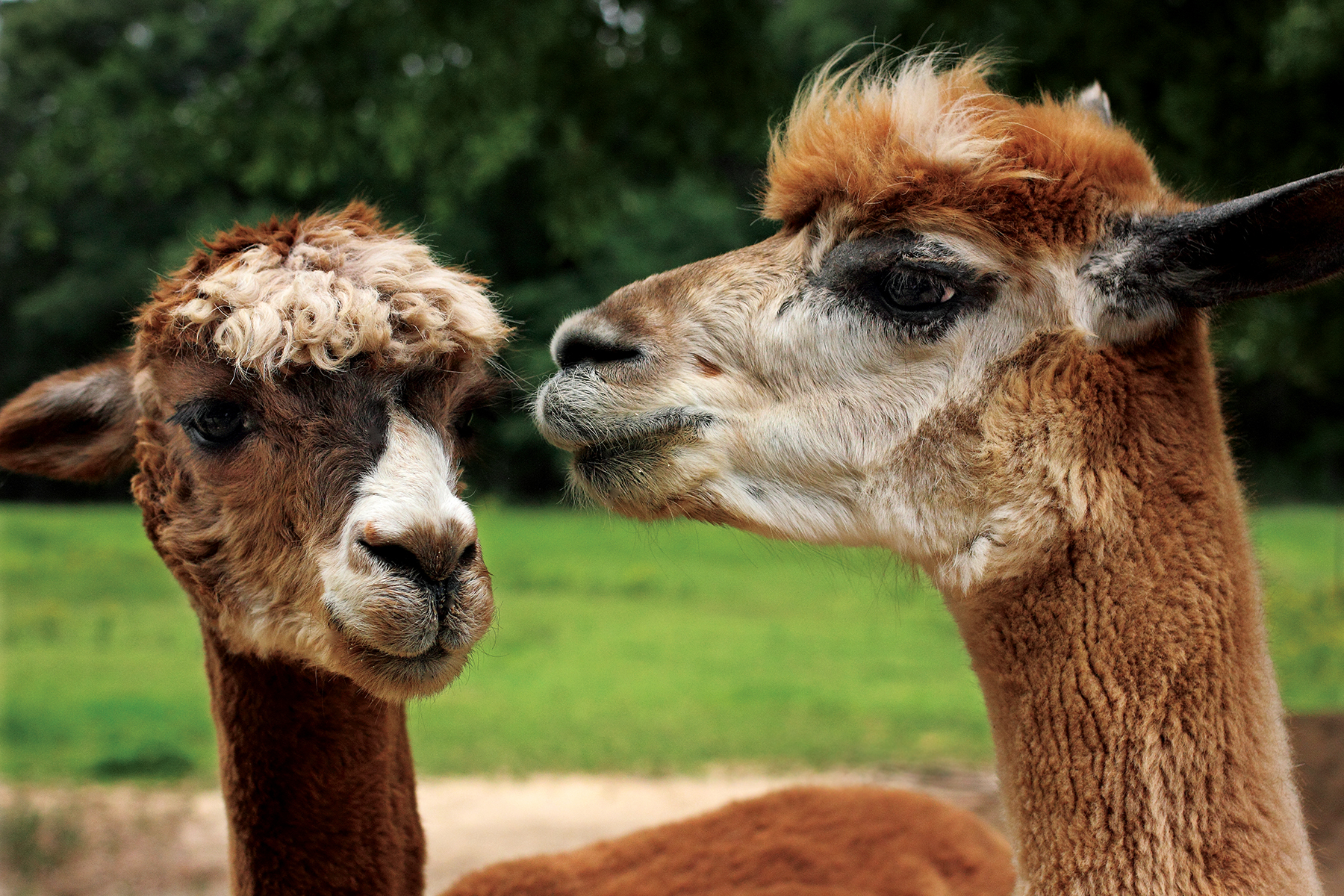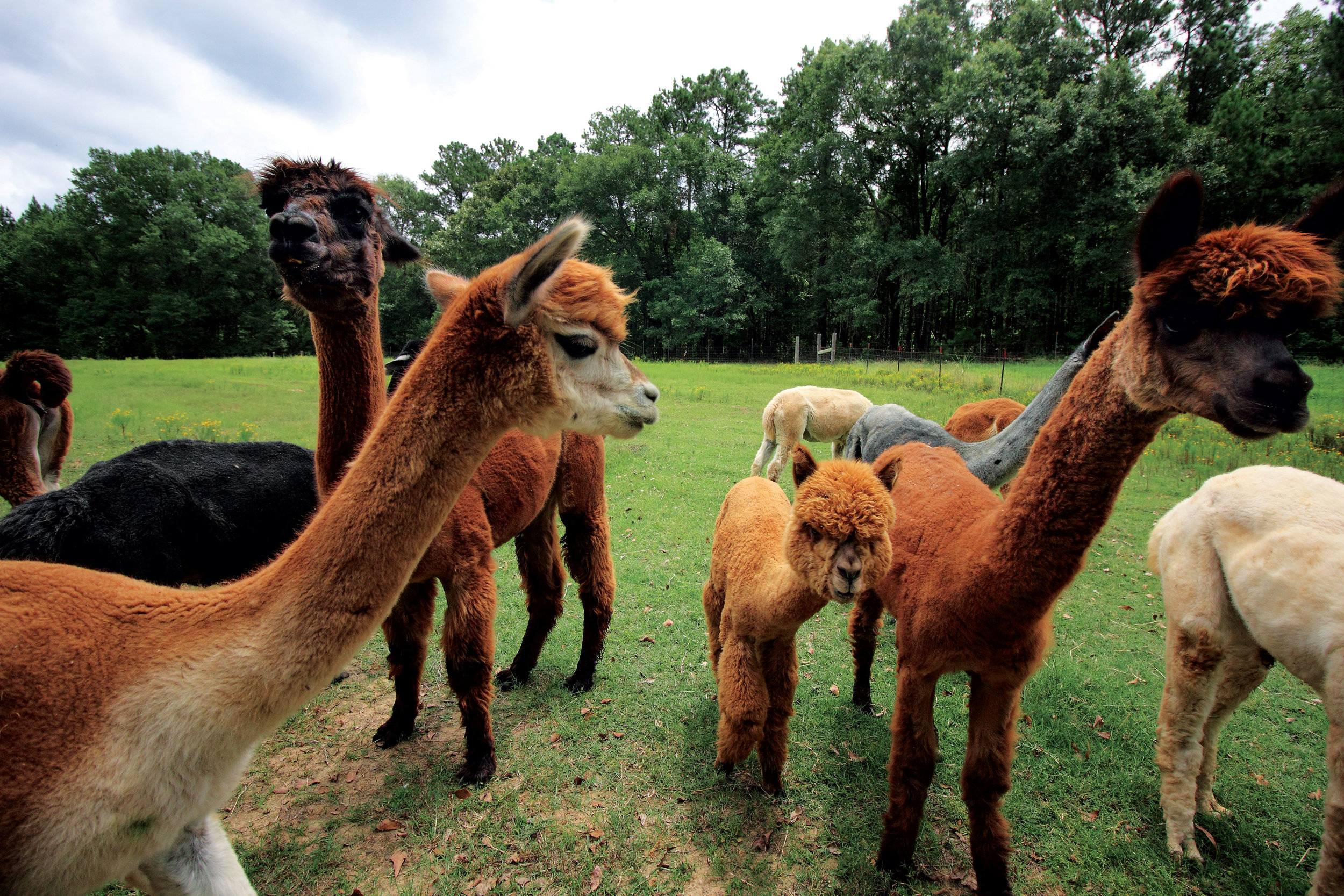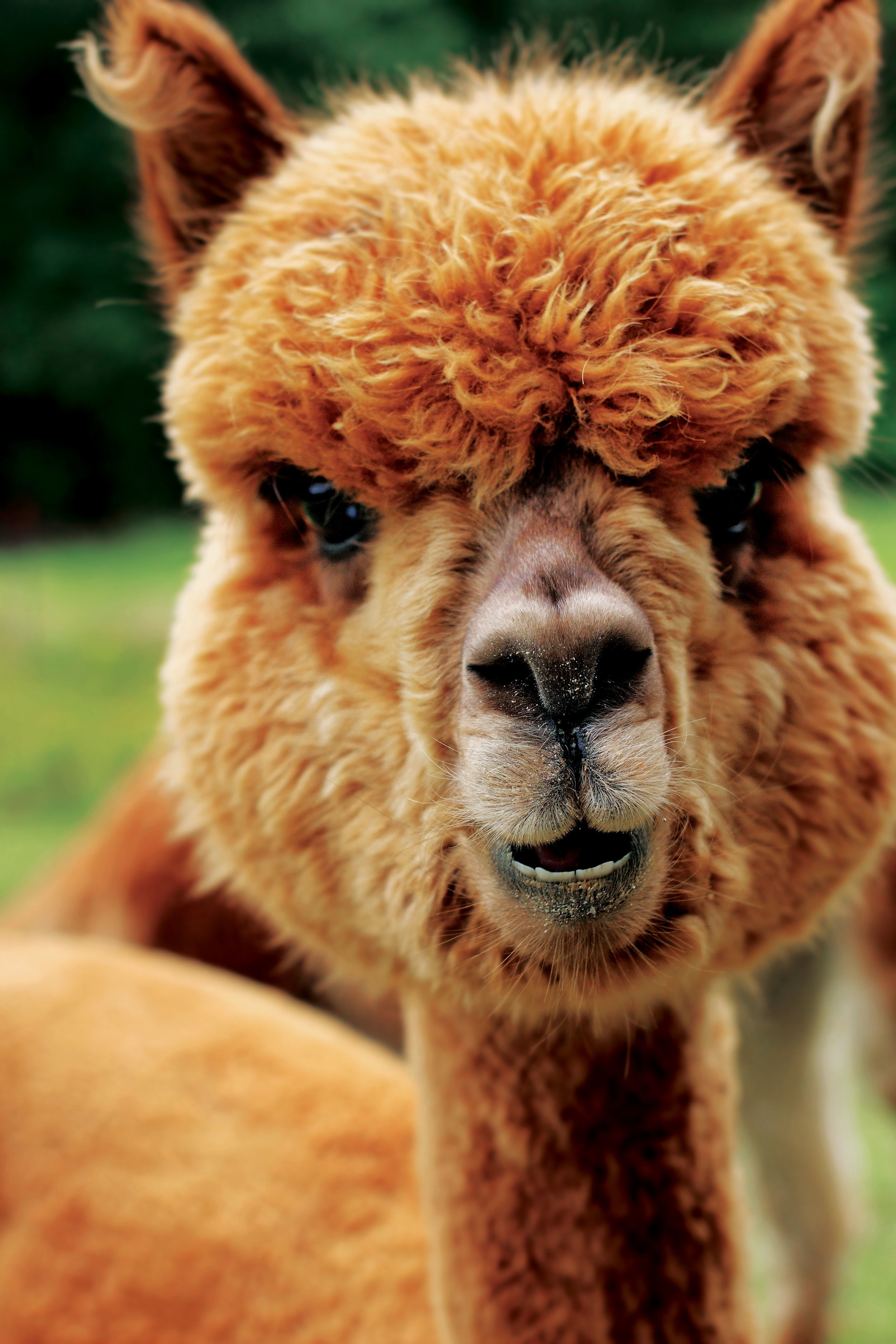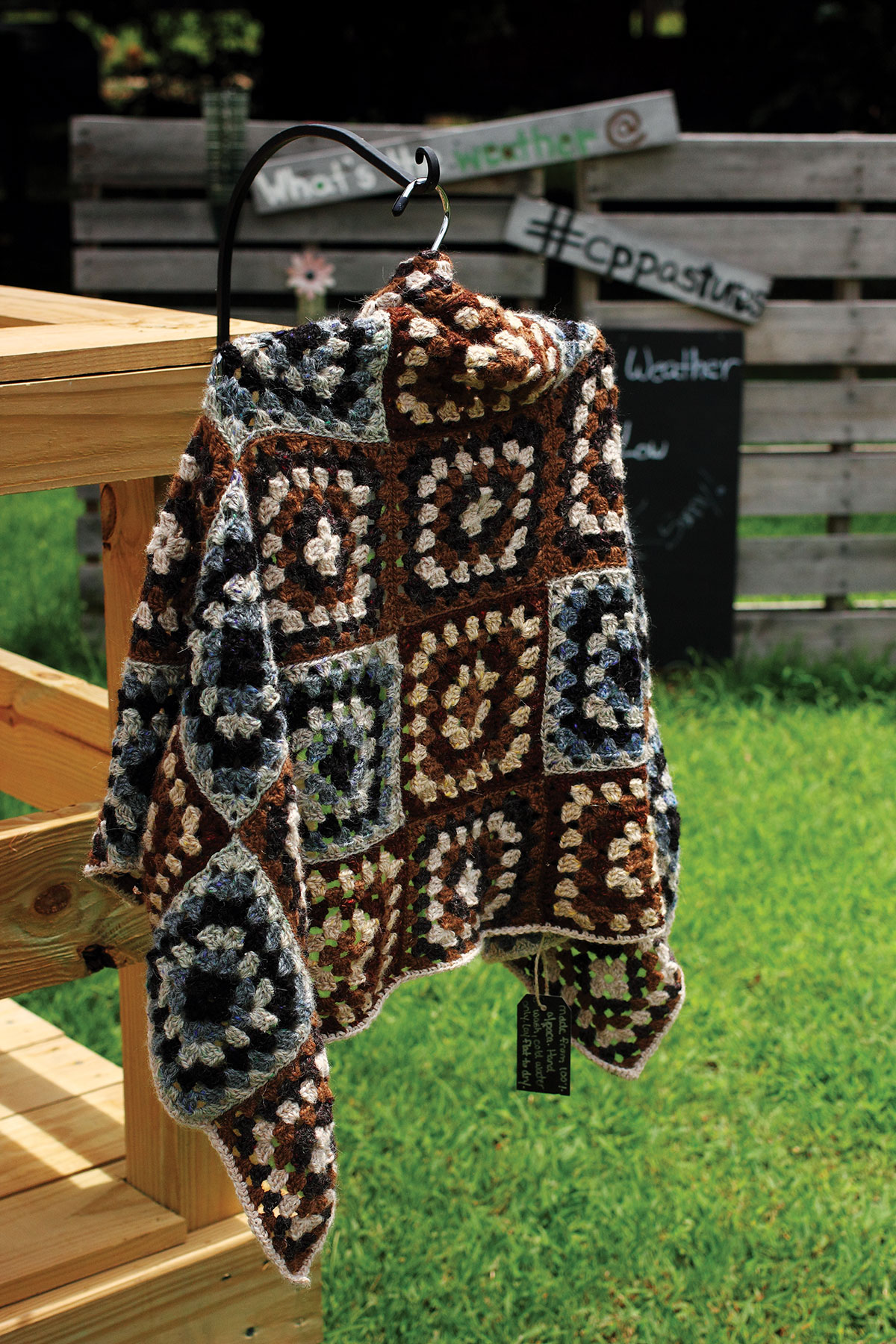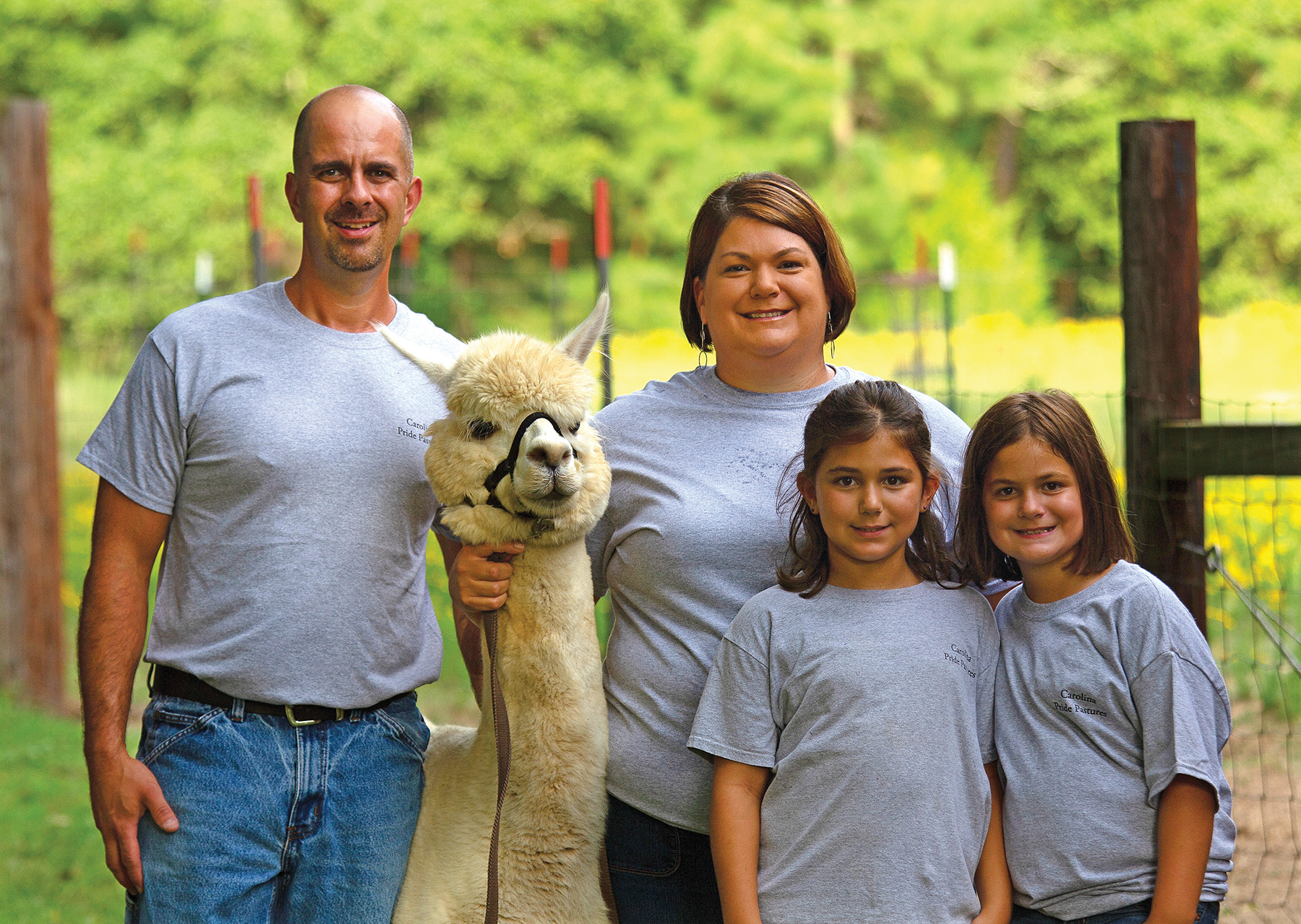Carolina Pride Pastures
Some babies just don’t sleep well. Alicia Berley Holbrook and her husband Eric’s youngest daughter Grace was one of those babies. Night owl Grace is the reason that business major Alicia runs an alpaca farm today. Her mother may have something to do with it, too.
It was a late night. Grace had woken up and Alicia had rocked and rocked. She still wasn’t back to sleep. Alicia yawned and murmured to baby Grace tiredly, “I guess we are in this for the long haul, Sweet Pea,” Rock, Rock, Rock. Alicia cut on the TV. A lady was talking about her alpaca farm. Alicia learned how efficient alpacas are and how relatively cheap they are to feed. She was enamored. Grace had long been asleep and Alicia was still watching TV at 3 am.
The next morning, after two hours of sleep, Alicia announced to Eric, “I want to be an alpaca farmer.”
His usual reaction to Alicia’s pronouncements is a look, usually accompanied with eye rolls, that loudly expresses, “That’s asinine and crazy.” This time, when it was crazy, if not asinine, he said, “Reeeeeally!!!” and went running out the door to work. Before lunch that day, Alicia had an email from him: “I goggled this alpaca thing. Kind of interesting.”
Alicia’s response: “Oh, yea. This is on. I am going to have alpacas. I had him hook, line and sinker.” It took two years for her to land that fish, oops, alpaca.
When this alpaca journey began, Alicia was a stay at home Mom keeping her two girls, Hannah and Grace, and her sister’s young son. She admits that part of her wanted to go back to the corporate world where she had put her University of South Carolina business degree to full use for over 10 years in Human Resources. But, she also knew that if she did, she would miss so much time with her children. Eric’s career was going very well when they had their first child so they decided to roll with her staying at home. As happy as she was, she said, “I would just get this itch every so often to just do stuff, business stuff.”
This alpaca itch would just not go away. She immediately went into business mode and began researching on the internet, checking out alpaca groups on Facebook, reading magazines, and sending emails to folks already in the business.
During this time, her sister had her second son so now Alicia was keeping four children under the age of three. Despite this full-time job, she said, “The more I read the more I got interested in alpacas.” She asked herself an important business question: “Are alpacas going to be just a pet, like a dog or cat, or [are they going to be] livestock that I can make a profit off of…a business?” The Business Major’s answer was business.
What better way to research the business possibilities than go to a class on alpacas on a Virginia farm entitled “Embracing your Investment.” Eric went, too. The class focused on everyday work and care of alpacas. That was fine, but Alicia wanted to hear her business stuff. She wanted spreadsheets. When she heard about them, she hit the panic button. She said, “$25,000 to get started?! Are you kidding?! We want to build a house. We have two little ones.”
Six hours up to Virginia and six hours back, Alicia and Eric talked and discussed every “what if…” possible. The panic receded a bit. The business major in her knew that the up-front investment was a long term one that they probably would recoup in five to ten years. That part was scary. The wife and mother in her knew that she was not going to be tied to a business that she could not take any time off with her family.
Growing up, Alicia’s parents ran a convenience store. Every summer they packed up and went to the beach for a week…except her father. He always stayed just a couple of days and then came home to run the store. She said, “I’m not doing that to my children or my husband. If we can’t leave the farm for a short time with someone, we won’t do it”
More “due diligence” research followed. “The lady in Virginia painted a pretty picture. Her barns were perfect. Everything was neat. I wanted to see the dirty side of alpaca farming, true reality,” said Alicia.
She and Eric went to visit On Again Off Again Alpaca Farm in Spartanburg. The name says it all. Owners Jürgen and Karen didn’t just talk about the reality of alpaca farming, they let Alicia and Eric not only get their boots dirty, but their legs and hands dirty. They gave shots to alpacas. They cleaned their stalls. They watered and fed them. You’ve heard of “boot camp.” This was DIRTY boot camp! And, they went back weekend after weekend to get dirty.
Alicia couldn’t believe that she loved it so much. She grew up in the country but not a farm. The field next to her childhood home was rented to a cow farmer. She hated the smell. During hay season, her allergies kicked up. “I hated it and never wanted to do it,” she said with a grin, wet hair, and a sweat-ringed t-shirt earned that morning cleaning out stinky alpaca stalls and watering the animals.
Alicia knew now she could do the work involved with alpacas. She knew she could teach someone to fill in for them when they needed to leave the farm. The business side of her knew that she was going to make money off the alpacas amazing fleece, milling it into yarn and creating beautiful objects to sell. There was only one more thing that needed to happen for Alicia to make the decision about alpaca farming. Her mother needed to tell her “No.”
Alicia invited her mother to go up to Jürgen and Karen’s farm to look at some possible alpacas to buy. Alicia laughed and recalled the day: Her mother took a look around the farm and all the work involved and told her, “I don’t think you need to do this. It’s a mistake. I think you are dealing with this on emotions, not your brain.”
Alicia admitted her mother might be right…, “So, I signed a contract.” It was for five pregnant females, and she had always said she didn’t want to do births on the farm. She had no barn and no fencing up. They had 90 days to take delivery on this crazy business dream.
Alicia will tell you that after all that research and thinking and networking and talking, it comes down to just pulling the trigger. It was almost exactly two years from her late night TV inspiration.
Eric and her brother-in-law came home from work every day and built the barn by truck lights and spent their Saturdays pulling fences. They finished up just days before the November 13, 2013 delivery of their first alpacas. Right before delivery, they got a sign that this project was a good one. A stray Great Pyrenees dog showed up at her mother’s house. Great Pyrenees are herding dogs. Not one to look a gift horse, make that dog, in the mouth, Alicia said a prayer and threw him into the newly fenced pasture. Big Girl protected and herded the alpacas-and the family-at Carolina Pride Pastures until her recent demise.
“OK, let’s make money now,” thought Alicia. She learned pretty quickly that the money showing up on the spread sheet from the fleece was there, but would bring in money months later. After the first alpaca shearing, she had to clean the fleece, find a mill and send the fleece, wait months for the yarn to be delivered, then knit and crochet the final products to sell. Alicia is proud to say that both of her fleece mills are in the southeast and are family run businesses. She was about eight months out from any money coming in. It was cash flow crunch time.
Alicia needed other income streams. Back to the internet she went. She found out about selling alpaca poop, of which she had plenty. She joined a “Marketing Your Alpaca Poop” Facebook group. It turns out that alpaca poop becomes safe fertilizer very quickly. Alpacas really are efficient.
She put an “Alpaca Fertilizer” sign up in her driveway, and she began selling bags of alpaca poop that paid for a couple of months of food. Today, it pays for all of the food for her herd.
Her daughter Hannah, who was in pre-school at Holy Trinity at the time, was responsible for the next side business: school tours. It was their first spring with Crias, baby alpacas. The kids wanted to come see the Crias after they went to Levers Farm and picked strawberries. Sure, said Alicia. When she had to give her daughter $5 for the tour at Levers, a light bulb turned on in her business head.
She called Lynette Lever at Lever Farms, who graciously told her everything she knew about tours. Why reinvent the “wheel,” so to speak. It made perfect sense for them to partner on future tours since they are both on Highway 34 about five minutes apart.
After this first tour, Alicia immediately sent out letters to everyone about her tours, which would now cost each child $5. Teachers and chaperones are free. She had some information from Lynnette on how she did tours, but nothing prepared her for the first big tour. This first tour after her daughter’s class was 50 kids for six hours. She still doesn’t know how she did it. She just knows she survived with the help of her family and was paid $250. That’s a lot of alpaca food.
Today, she has teaching banners like Lynette at Lever Farms does. She gives little gifts to each child like Lynette. She has a curriculum that supports the state standards thanks to advice from teacher friends, Katie and Glynnis. Artist Tyla Bowers drew alpacas on a board with face cut outs for photo ops. Pinterest inspired a tumbler built to demonstrate the fleece cycle, with illustrations by Marion Zobel, a teacher and artist. Marion has also done a board that shows South Carolina and Peru, which illustrates and teaches geography standards. Alicia just sent sign pictures to Marion that are her next project. This sign will illustrate the alpaca poop fertilizer process.
Finally, the first alpaca yarn came in and the next cottage industry was born. Alicia farmed out the yarn to her two sister-in-laws, and they started knitting away. Scarves, finger-less gloves, and hats were knitted and crocheted and sold at Oktoberfest in Newberry. They also offer other unique knitted gifts, often inspired by Pinterest.
She also has a booth at Soda City Farmers Market in Columbia during the winter season of November, December and January. It’s gone so well in Columbia that she did not have enough finished products to sell in January this past year. Alicia and her girls are planning to learn how to knit very soon.
This year at the second Newberry County Ag and Art weekend in June, Carolina Pride Pastures had a grand opening for the on-site gift shop. In addition to handcrafted items and alpaca yarn, they sell alpaca wool socks.
The gift shop has given rise to a new business: Knitter Laura, Alicia’s sister-in-law, will soon be teaching knitting classes at the new shop. You know you want to learn to knit with alpaca yarn available at the shop!
Alicia also has a long term growth plan for her dream business. Her husband Eric said the idea is “Nutty. Craziest thing I’ve ever heard.” Alicia laughed, “This is a man from Wooster, Massachusetts who is now living in Pomaria. He also has lived three years in Antarctica and hates cold weather.” All this and married to Alicia, he should know crazy.
Here’s the crazy idea. They have only developed three acres of their 16-acre farm. As their herd of alpacas grows, Alicia wants to develop another two acres with a barn and pasture. That’s not the nutty part. She eventually wants to put tiny houses—really cute ones made in Campobello—around the pasture and barn for urban weekend visitors. “It’s perfect,” she said. “They can participate on the farm if they want to do that. And, Newberry has lots of activities in town like the Opera House, great restaurants and shopping. We have Enoree Winery right down the road. And, we now have Uber.”Other than adding a pond to the pasture, barn setting, I think it is brilliant, but then I am an English major. What do I know about business?!
It’s been seven years since Alicia’s business dream was born rocking her baby and watching TV. It’s been five years since Alicia’s mother said, “Not a good idea.” and the first Alpacas were delivered to Newberry County and Carolina Pride Pastures in Pomaria. It’s been very hard work. It’s been about building a support community. It’s been a steep learning curve for farmer Alicia, who is a stellar example of the new agri-tourism family farmer. It’s also been a joy and a lot of fun. The business major and the Mom are happy. And, yes, the family went on vacation this year for a whole week!
“Looks like we are in this for the long haul, sweet pea.” No truer words have ever been said.
National Alpaca Day September 29 and 30. Carolina Pride Pastures will be open for free tours. Check the website for details.
Carolina Pride Pastures 803-480-350 | 1416SC Hwy 34, Pomaria, SC 29126www.cppastures.com; Alicia@cppastures.com On Pinterest, Facebook, Instagram and Etsy



